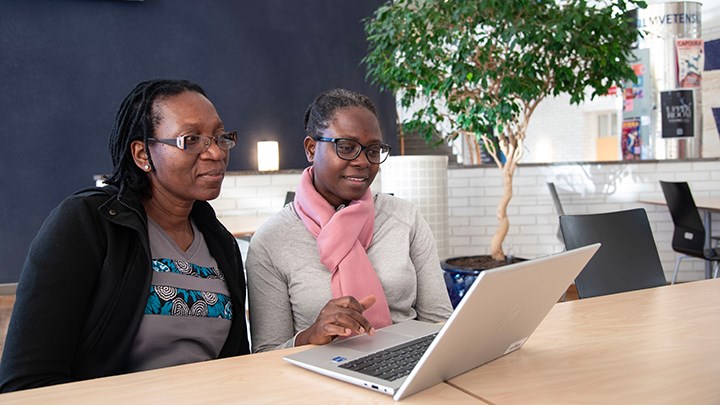Research in Örebro contributes to knowledge on women’s health in Mozambique

Sexually transmitted diseases affect primarily women in Mozambique. Alice Manjate’s and Lucília Trindade Lovane Matias’s doctoral theses at Örebro University have contributed to in-depth knowledge that can tangibly improve prevention efforts and healthcare in their home country of Mozambique.
Sexually transmitted infections pose a significant threat to women’s health in Mozambique. Research linked to Örebro University has demonstrated ways that can improve diagnostics and care.
Alice Manjate, who has defended her doctoral thesis in medicine at Örebro University, demonstrates that current methods may lead to over-treatment with antibiotics. Lucília Trindade Lovane Matias, with a doctorate in biomedicine, has studied the link between HIV and cancer.
Both have divided their time as doctoral students between Örebro University and their hometown university in Maputo. Sida funded their studies as part of a 20-year programme to strengthen scientific expertise in Mozambique.
One study shows that symptoms are the basis for diagnoses in Mozambique[JG1] .
“Quite often, the diagnosis is incorrect since vaginal discharge does not necessarily indicate severe problems, and the staff lack the proper resources to establish the medical reason. Consequently, this may lead to over-treatment with antibiotics, which increases the risk of multi-resistance,” says Alice Manjate.
Fails to detect acute HIV infections
In Mozambique, over 12 per cent of the population is HIV-positive. In a second sub-study of her doctoral thesis, Alice Manjate shows that screening methods currently used in Mozambique do not detect acute HIV infections.
“Accurate diagnoses are essential to target preventive measures at the right groups,” says Alice Manjate.
Lucília Trindade Lovane Matias has examined the connection between human papillomavirus (HPV) and cervical cancer, which is the fourth most common type of cancer globally – and causes many women’s deaths. The leading cause of cervical cancer is long-term HPV infections. Her study also considers HIV infections.
“I wouldn’t have been able to analyse the samples from women at home in Mozambique because we lack the necessary lab equipment – the sort available in Western countries. I’ve also worked on designing a simpler method to detect cervical cancer, adapted to the conditions in Mozambique,” explains Lucília Trindade Lovane Matias.
A lack of resources
Lucília Trindade Lovane Matias is continuing her work in Maputo, just like Alice Manjate. Whether their proposals for improving primarily primary healthcare will be realised depends on available resources. Today, there are insufficient doctors to meet their country’s needs – even examination rooms.
The primary aim of inviting doctoral students from Mozambique to Örebro is to ensure they receive support, including supervision and laboratory facilities.
“One of the ideas behind this programme is to strengthen expertise in those who’ve defended their theses so that they can supervise upcoming doctoral students in Maputo,” says Sören Andersson, professor of medicine at Örebro University – and the principal supervisor for Alice Manjate and Lucília Trindade Lovane Matias.
He also underscores the mutual benefit of the collaboration:
“Both partners benefit from this scientific collaboration. Sexually transmitted diseases exist worldwide. Here in Sweden, we have more cases of chlamydia but fewer cases of HIV than in Mozambique. However, the problems share similarities. More knowledge and better methods are positive for the whole world,” says Sören Andersson.
Sida has funded the ongoing collaboration between Sweden and Mozambique for over 20 years. Initially, doctoral programmes focused on sexually transmitted infections (STIs) such as syphilis, later HIV, and today on gonorrhoea and HPV. Doctoral students share their time between their home country and Örebro University.
In addition to medicine and biomedicine, the programme includes natural sciences, agriculture, and social sciences. Other countries like South Africa and Portugal have joined as partners. Eduardo Mondlane University in Maputo is now qualified to examine doctoral candidates, which has been a key long-term goal of the programme.
Over the years, around 100 doctoral candidates have graduated, and currently, several master’s students are preparing for their degrees.
Text: Maria Elisson
Photo: Maria Elisson
Translation: Jerry Gray
